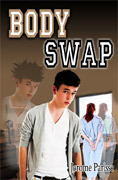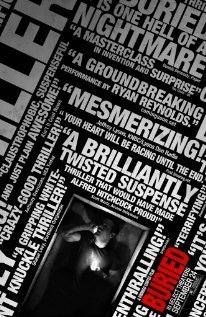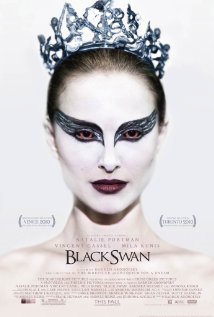Jerome Parisse's Blog, page 16
March 10, 2011
It's Friday! Body Swap interview, Yunnan trip etc
Only two more days in Hong Kong! I am getting ready for a trip to Kunming (Yunnan, China) which will see me away from home for six weeks. I will be going to a Mandarin school in the morning to improve my Chinese speaking and reading skills, so that I can be fluent enough to work in the language. I am looking forward to the experience, although I know it will be challenging. I'll continue to work in the afternoons, in between excursions and discovery trips. Yunnan is a stunning region with many minorities living there. I will make sure to let you know what it's like.
I'm excited to be going to the theatre to see In the Next Room or The Vibrator Play tonight, for which I will post a review tomorrow. On another note, I have been interviewed by Jess C Scott, author of The Other Side of Life about my novel Body Swap and my work. You can read the full interview here.
Author Interview #26, with author/playwright/management consultant Jerome Parisse, who grew up in France where he developed a love for language, literature, and good food!








March 9, 2011
The Corrections, by Jonathan Franzen
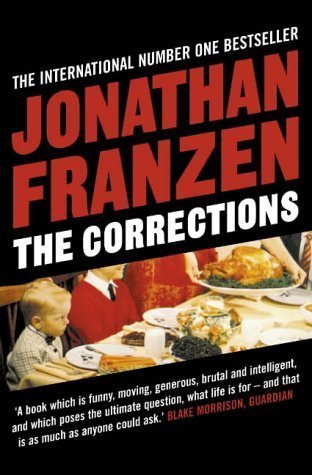 Phew! I made it through to the end of The Corrections (Jonathan Franzen)! I started it with great expectations, since some of the reviews are fantastic and a friend of mine whose judgement I trust loved it. I found it painful. Franzen can certainly write well, he is witty and funny. But I found that unfortunately his writing turned too often into verbal diarrhea. In fact I felt as if Franzen was pleasing himself instead of trying – even a little – to please his readers. It's writing that draws attention to itself, something that I can't stand. Each of the main characters in the book is damn awful, and impossible to like (to say the least). There's nothing intrinsically wrong with that, except that reading more than five hundred pages about their lives when you don't care the least about them quickly becomes a chore. There's also heaps of secondary characters who muddle the story. Having said that, I must agree that Franzen has a knack of getting you into the characters' head, of making you feel you somehow understand them. As a book that aims to criticise society, it does a good job, but couldn't it have done so while providing readers with (a little) pleasure at the same time? The Corrections was a finalist for the 2002 Pulitzer Prize for Fiction. It also attracted attention when it was selected for Oprah Winfrey's Book Club, but Franzen later expressed worries that this selection could detract male readers from buying the book. It was subsequently taken off the Club's list. Oprah obviously forgave him because she picked his latest novel, Freedom, as her 64th Book Club selection. And yes, you guessed right, I won't be reading it.
Phew! I made it through to the end of The Corrections (Jonathan Franzen)! I started it with great expectations, since some of the reviews are fantastic and a friend of mine whose judgement I trust loved it. I found it painful. Franzen can certainly write well, he is witty and funny. But I found that unfortunately his writing turned too often into verbal diarrhea. In fact I felt as if Franzen was pleasing himself instead of trying – even a little – to please his readers. It's writing that draws attention to itself, something that I can't stand. Each of the main characters in the book is damn awful, and impossible to like (to say the least). There's nothing intrinsically wrong with that, except that reading more than five hundred pages about their lives when you don't care the least about them quickly becomes a chore. There's also heaps of secondary characters who muddle the story. Having said that, I must agree that Franzen has a knack of getting you into the characters' head, of making you feel you somehow understand them. As a book that aims to criticise society, it does a good job, but couldn't it have done so while providing readers with (a little) pleasure at the same time? The Corrections was a finalist for the 2002 Pulitzer Prize for Fiction. It also attracted attention when it was selected for Oprah Winfrey's Book Club, but Franzen later expressed worries that this selection could detract male readers from buying the book. It was subsequently taken off the Club's list. Oprah obviously forgave him because she picked his latest novel, Freedom, as her 64th Book Club selection. And yes, you guessed right, I won't be reading it.








March 8, 2011
Buried
Buried is amazing for more than one reason. First, the whole movie takes place… in a coffin. Yes, you read me right, in a coffin… ninety minutes of action in the restricted space offered by a mere coffin. When you suffer from claustrophobia, as I do, you are sure to be moved by this film. And if you make the mistake of watching it on a plane as I did, the effect is guaranteed! Ninety minutes in a coffin… a boring movie? Not at all. The director, , did a great job, varying the angles, the light, the atmosphere, while staying true to the story at the same time. plays Paul, an American truck driver who is captured in Irak when the convoy he is driving is attacked. He wakes up buried alive in a coffin and soon realises that his raptors have put a ransom on his head. Paul is also quick to realise that the world is in no hurry to provide him with the help he is desperate for. An interesting premise, and one that is explored well in this fantastic movie. We see no one else but Reynolds in the entire film, even if we do hear several other voices. It's a great performance by Reynolds. Oh, and I was totally taken by surprise by the ending. I literally didn't see it coming. Duh! I hear you say…. what could happen in a coffin? You'll have to watch Buried to find out. I won't be the one telling you…









Author interview: Ian Tuttle
I love short stories, but I find they often don't get the attention they deserve. Ian Tuttle has written one that is very successful, called The Submersible. In this interview he tells us more about his short story, but also his writing process and what lies ahead for him.
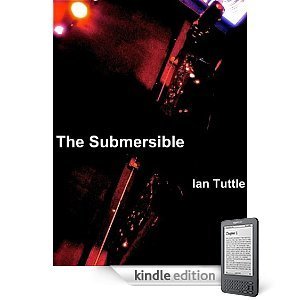 Jerome: What can you tell us about The Submersible?
Jerome: What can you tell us about The Submersible?
Ian: The Submersible is a 1,300 word short story about a man all alone in a deep sea research vessel. He tries to maintain his relationship with his lover, Sasha, through the internet, but he loses her.
Jerome: Who are your readers?
Ian: Over 12,000 people read the story in one month when I posted it on Scribd.com last summer. I heard back from people of all ages from all over the world. At its heart, the story is about love, separation, and longing. These feelings resonate, I think, with everyone.
Jerome: What was your journey as a writer?
Ian: I always wanted to be a writer but I was terrified of trying it. I was worried I'd suck at it, that I'd be exposed as a fraud, that I'd try very hard and fail. Finally I told myself,
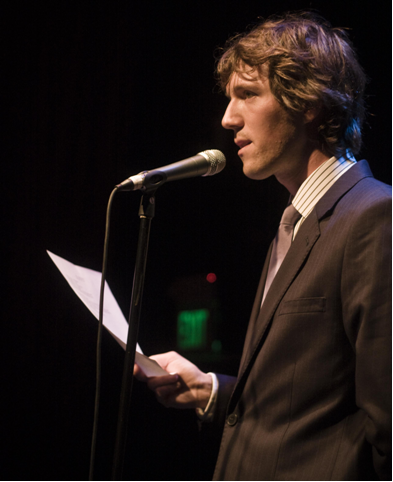
photo by Timothy Faust: http://www.tjfaust.com/
"You are going to suck at it at first. Just work hard and take advice and practice, practice, practice." It took me about six months of steady writing, about two hours a day, before I could separate my emotions (shame and embarrassment) from what I was producing. I submitted a story to a reading series called "Quiet Lightning," (http://qlightning.wordpress.com) and it was accepted. I had to stand up on stage and read it to strangers. It was terrifying, and so rewarding. It was a rite of passage.
I attend a weekly writing workshop, I set goals for myself, and I've involved myself in the local writer's community. The support and camaraderie of other writers has had a tremendously positive impact on my work and my personal development. Reading at public events, like Quiet Lightning, and at open mics, has also been an important positive influence. It's like product-testing with instant feedback. Scary, yes, but efficient!
Jerome: Do you follow a specific writing process?
Ian: When I'm writing, I have to turn off the internet, quit my email program, sometimes set a timer for twenty minutes and block out all distractions. I've kept word-count charts with weekly and monthly goals for my novel. I commit myself to events and contests so that I have deadlines. Also, I always carry a notebook, even if it's sometimes in the form of a cell phone.
Jerome: Where do you find inspiration?
Ian: If I experience a strong feeling or mood, I ask myself, "Where did that come from? What is the cause, and what will be the effect, of that feeling?" Stories, to me, are all about cause and effect. They're like big logic problems. A story is like a theorem. You have to set out the assumptions, the principles, then move your reader through the process, so that at the end they've arrived at an inevitable and irrefutable conclusion.
Jerome: Who are your favourite authors?
Ian: Gosh, whoever I'm reading right now. And whoever is actively writing right now. I love reading my friends' work. Then, of course, I've read Great Gatsby about twenty times, or more. I love William Gibson because he so efficiently conveys atmosphere. Virginia Woolf, John Steinbeck, James Salter, Hemingway, Pynchon, Nabokov. Authors who play with the medium, like Steven Hall in Raw Shark Texts, Palahniuk, Alex Garland.
Jerome: Is there a book you wish you had written? Which one?
Ian: A Sport and a Pastime, by James Salter.
Jerome: Do you have any tips for budding writers?
Ian: If you are writing, then you are a writer. Call yourself a writer. Tell other people you are a writer. Self-affirmation is a simple yet incredibly powerful tool.
Also, your job is to condense hours and hours of your own careful thinking into a reading experience that lasts a few minutes. Keep a hundred words for every thousand you write. Don't waste your reader's time.
Read your work to anyone who will listen, ask for their feedback, and when they give it, don't say a peep in response. If your reader "just doesn't get it," it's not their problem, it's yours.
Finally, if anyone hires you to write, take the job. You will learn so much about efficient communication by translating other people's thoughts into words, and their satisfaction will be the ultimate judge of your effectiveness.
Jerome: What are you working on at the moment?
Ian: Short fiction in real places, at http://stretchyhead.com. A collection of those Stretchyhead stories will be published Spring, 2011. I'm halfway through a novel. Also, a few short stories in the works.








March 7, 2011
Black Swan
What a wonderful film! plays Nina, a young ballerina in a New York City ballet company who is totally obsessed with dancing. She lives with her suffocating mother, a former ballerina, . When the company's artistic director Thomas, played by , chooses Nina as prima ballerina for their new production of Swan Lake, things start going wrong. Nina turns into paranoia, believing that another dancer wants her job. Nina initially has difficulty playing the darker side of the swan, the "black" swan. But she slowly gets in touch with her own darker side and, as she focusses entirely on becoming the swan of the production, she starts to lose her mind. Portman does a wonderful job, and so does Cassel. The story is very dark, unsettling, and plays with your mind. A must see!









March 3, 2011
The Insomnia of Stars (L'insomnie des etoiles), by Marc Dugain
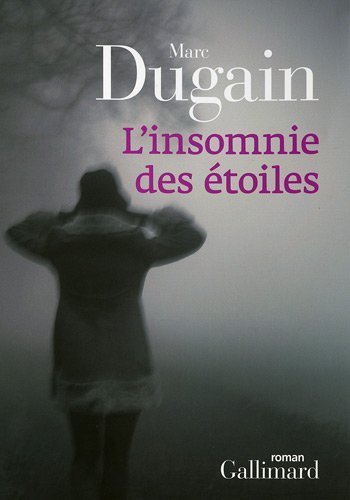 Marc Dugain is a French novelist who became famous for The Officers' Ward (1999), a novel set in World War I. His latest novel, L'insomnie des etoiles takes places at the end of World War II, in Nazi-torn Germany. The Allied Forces, the French ones in this case, occupy Germany. In an isolated farm, they find a starving girl left to her own devices, and, in a trunk, charred human bones. A French officer, an astronom before the war, feels that the mystery behind this macabre discovery could lead him to much sinister events that have happened in the past, in the village that is now under his control. He won't stop his enquiry until he finds out the shocking truth.
Marc Dugain is a French novelist who became famous for The Officers' Ward (1999), a novel set in World War I. His latest novel, L'insomnie des etoiles takes places at the end of World War II, in Nazi-torn Germany. The Allied Forces, the French ones in this case, occupy Germany. In an isolated farm, they find a starving girl left to her own devices, and, in a trunk, charred human bones. A French officer, an astronom before the war, feels that the mystery behind this macabre discovery could lead him to much sinister events that have happened in the past, in the village that is now under his control. He won't stop his enquiry until he finds out the shocking truth.
Dugain loves his writing to be concise; short sentences, clear ideas, effective dialogues. The officer's quest quickly becomes the reader's. This is stunning writing and an intriguing story in a fascinating historical context. A real tour-de-force.








March 2, 2011
Back in Sydney…
I am back in my hometown for a few days and it reminds me of why I like Sydney so much. Clear skies (well, most of the time…), thick vegetation, stunning beaches, beautiful skyline, colourful birds, excellent food … all this in a relaxed atmosphere. I will be moving back here in six months' time and I am looking forward to it. For those who've never been to Sydney, here are a few pictures…








February 27, 2011
Author interview: Michaelbrent Collings
Michaelbrent Collings is the author of the bestselling thrillers RUN, Rising Fears, The Loon. His latest novel is called The Stranger Inside.
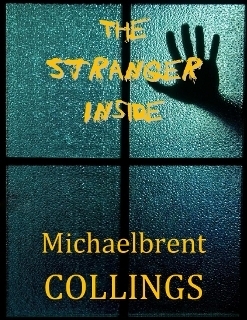 Jerome: What can you tell us about The Stranger Inside?
Jerome: What can you tell us about The Stranger Inside?
Michaelbrent: The Stranger Inside is a really fun little thriller about a family who wakes up one morning to discover that they've literally been entombed in their own home: all the doors and windows are nailed shut, all windows are covered in sheet metal so it's impossible to leave. They have to figure out a) why this has happened, and b) how to get out. Oh, and did I mention that the guy who did it to them is inside, too? And that he's a very disturbed individual? So in that sense it's kind of a cheerful story. Like something you'd hear during Christmas, if you were listening to that one aunt of yours who is a bit "disturbed." Ha!
Jerome: Who are your readers?
Michaelbrent: My mommy and daddy say I'm very good. Seriously, though, that's a good question. One of the toughest parts of being a writer is slaving away day after day and then waiting weeks or months or even years to find an audience. And then it's hard to say what kind of an audience you've found. I write thrillers with a "Dean Koontz"-ish feel (yes, I just made up the word "Dean Koontz"-ish…I'm allowed to…I'm a writer). Meaning that I try to have them scary as all get go, but with an ending that uplifts – or at least doesn't make you want to take a pair of bolt cutters to your own wrists in an effort to escape the horror of it all.
Jerome: What was your journey as a writer?
Michaelbrent: My journey as a writer began as I entered the fallopian tubes of my  mother…Oh, wait. I think you meant something different there. My bad. My journey as a writer began before I was born. My father was an English professor, and he was constantly rubbing elbows with writers. It wasn't unusual for him to be corresponding with or going to the houses of such luminaries as Stephen King, Dean Koontz (of "Dean Koontz"-ish fame), Orson Scott Card, and many others. So between my father's genetic predisposition toward writing and the fact that very cool author types were always around, I was pretty much doomed from the start. And now look at me! Or don't. I'm not easy on the eyes, I know.
mother…Oh, wait. I think you meant something different there. My bad. My journey as a writer began before I was born. My father was an English professor, and he was constantly rubbing elbows with writers. It wasn't unusual for him to be corresponding with or going to the houses of such luminaries as Stephen King, Dean Koontz (of "Dean Koontz"-ish fame), Orson Scott Card, and many others. So between my father's genetic predisposition toward writing and the fact that very cool author types were always around, I was pretty much doomed from the start. And now look at me! Or don't. I'm not easy on the eyes, I know.
Jerome: Do you follow a specific writing process?
Michaelbrent: Yes. I specifically write. That's the big secret, you know. It's not enough to say "I wanna be a writer someday." You have to actually roll up your sleeves, put ink to paper (or fingers to keyboard, as the case may be), and get to work. So my process mostly involves writing as much as possible. And the laws of averages says that if you do that enough, at least some things you write should be palatable.
Jerome: Where do you find inspiration?
Michaelbrent: Everywhere. Right now I'm making up a story in my mind about a writer who volunteers to do an interview for a blog, only it turns out that the blog owner is a secret government assassin trained by psychokinetic whales to rid the earth of all seaweed. Of course, that's just the first draft idea. A lot of the mess will be cleaned up in the second draft.
Jerome: Who are your favourite authors?
Michaelbrent: Dean Koontz, Orson Scott Card (both friends of mine, I'm proud to say, and both truly wonderful guys), Brandon Mull (another pal I was lucky enough to grow up with), Stephen King, Stephen Hunter, and anyone else who can write a good ol' edge-of-your-seat nail biter.
Jerome: Is there a book you wish you had written? Which one?
Michaelbrent: The Da Vinci Code. 'Cause really, who wouldn't want to have written something that outsold the phone book?
Jerome: Do you have any tips for budding writers?
Michaelbrent: WRITE. If you want to be a writer, then don't wait for the right time or the right story. No such thing. There is just you and a blank page (meaning you're not a writer), or you and the words that you commit to paper (meaning you are one). Writing is about writing, plain and simple. So write often, and you'll find that writing well comes with it.
Jerome: What are you working on at the moment?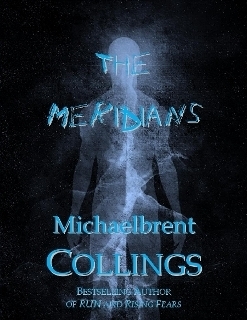
Michaelbrent: I just finished up a book called The Meridians, which is a very cool thriller about a cop whose family is killed. Then about a decade later, the killer returns to finish the job. Only the twist is that the killer has undergone some changes, and now comes equipped with some very…disturbing…powers. And the killer is also targeting a woman and her autistic son (who also turns out to have more than a normal range of talents), so the cop, the woman, and her son have to go on the run long enough to figure out how to defeat their nemesis, and, of course, long enough to find out the secret behind The Meridians.








Educating Rita
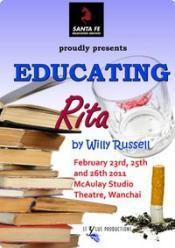 Last night I saw "Educating Rita", the play by Willy Russell at the McAulay Studio in Wanchai, Hong Kong. For those of you who don't know the play, it premiered on the 10th of June 1980 at the Royal Shakespeare Company Warehouse in London with Julie Waters as Rita and Mark Kingston as Frank, and received the Laurence Olivier Award for Best New Comedy. It was also adapted into a movie in 1983, starring Michael Caine and Julie Walters, and directed by Lewis Gilbert.
Last night I saw "Educating Rita", the play by Willy Russell at the McAulay Studio in Wanchai, Hong Kong. For those of you who don't know the play, it premiered on the 10th of June 1980 at the Royal Shakespeare Company Warehouse in London with Julie Waters as Rita and Mark Kingston as Frank, and received the Laurence Olivier Award for Best New Comedy. It was also adapted into a movie in 1983, starring Michael Caine and Julie Walters, and directed by Lewis Gilbert.
Educating Rita is the story of the relationship between a young working-class hairdresser from Liverpool and Dr. Frank Bryant, a University lecturer in English literature, which takes place during one full year. We witness how Rita (who later calls herself Susan), dissatisfied with her life and education level, enrolls in an Open University course in English Literature, meeting her tutor Frank and learning "everything" from him. Rita learns fast but Frank (who deals with his own demons) is devastated to see her losing her individuality and the mere reason why he's fallen for her. He can't bear to see her adopt the superficiality of so many of the other students. It's an interesting topic, it's fun to watch and it makes you think… all the ingredients of a good play – and a good night.
The actors, Kim Haslam and Adam Harris, did a good job, even if – in true Hong Kong style! – they were sick: Haslam tried to suppress a nagging cough during the whole play (through lots of drinks and a few Fisherman's friends - I admire her for being able to speak clearly with one of those in her mouth) and Harris had the sniffles. They were not the only ones; the audience echoed their plight! An honest production.








Birdman, by Mo Hayder
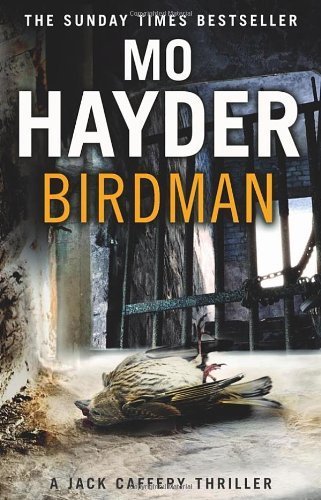 Birdman is Mo Hayder's first novel, published in 2000. As an entrée served by Hayder before a long list of courses more bloody and frightening than each other, Birdman is perfect. In her debut novel, Hayder introduces Jack Caffery, a detective who will feature in some of her subsequent novels. "Birdman" is the nickname given by the police to a serial killer who has buried five of his victims – five butchered women – in an empty field in London's Greenwich area. Caffery soon realises that the psychopath he is on the trail of is much, much worse than any other he has ever encountered before. Hayder's writing is not dissimilar to the scalpel used by Birdman: precise, lacerating, and bloody. But it's also effortless, and like any good writing, doesn't draw attention to itself; it simply serves its purpose, a story that will keep you on edge untill the very last page of the book. Hayder makes smart use of the environment, the sounds, the colours and the smells; it's almost as if it were not a story you're reading, but a film played on the screen of your mind. Even better, her dialogues sound true and efficient. But what distinguishes Hayder's crime novels from others is an ability to create characters who are real people, not flawless heroes. These characters don't work in isolation, the search for the killer is a team effort win which every member of the crime division has a role to play. And Caffery is simply the musical director who facilitates the development of the piece. I had read Gone - another Jack Caffery novel - before reading Birdman, but this was not a problem. Each Hayder book can be read as a standalone. Birdman shows all the signs of a great writer, including some of the subtlety and smart plotting that Hayder will further develop in her other novels.
Birdman is Mo Hayder's first novel, published in 2000. As an entrée served by Hayder before a long list of courses more bloody and frightening than each other, Birdman is perfect. In her debut novel, Hayder introduces Jack Caffery, a detective who will feature in some of her subsequent novels. "Birdman" is the nickname given by the police to a serial killer who has buried five of his victims – five butchered women – in an empty field in London's Greenwich area. Caffery soon realises that the psychopath he is on the trail of is much, much worse than any other he has ever encountered before. Hayder's writing is not dissimilar to the scalpel used by Birdman: precise, lacerating, and bloody. But it's also effortless, and like any good writing, doesn't draw attention to itself; it simply serves its purpose, a story that will keep you on edge untill the very last page of the book. Hayder makes smart use of the environment, the sounds, the colours and the smells; it's almost as if it were not a story you're reading, but a film played on the screen of your mind. Even better, her dialogues sound true and efficient. But what distinguishes Hayder's crime novels from others is an ability to create characters who are real people, not flawless heroes. These characters don't work in isolation, the search for the killer is a team effort win which every member of the crime division has a role to play. And Caffery is simply the musical director who facilitates the development of the piece. I had read Gone - another Jack Caffery novel - before reading Birdman, but this was not a problem. Each Hayder book can be read as a standalone. Birdman shows all the signs of a great writer, including some of the subtlety and smart plotting that Hayder will further develop in her other novels.
Two small things disappointed me in Birdman, maybe because I had experienced some of Hayder's later writing. The first disappointment is that towards the end of the story, Caffery does two things which make me instantly lose my compassion – and my interest - for him. If I had not read Gone, maybe I wouldn't have wanted to experience him again. The other disappointment was, once again towards the end of the book, what I perceived as gratuitous gore - the story could have ended without it and without losing any of its edge. This said, and not to end on a downer since I really liked the novel, Birdman is a one-sitting type of read, a story full of twists and dead ends that I guarantee you will not see coming, a book to be read absolutely by any crime lover.
I was given "Birdman" by Transworld Publishers as part of The Great Transworld Crime Caper, in which I am currently taking part.








Jerome Parisse's Blog
- Jerome Parisse's profile
- 25 followers


